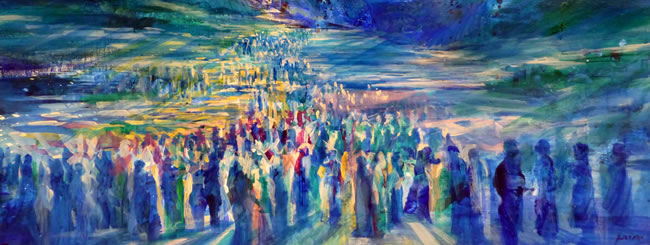Parshat Beshalach makes me think of my father. Years ago he bought me a necklace with a pasuk on it- and at the time he bought it for me, I had no clue why THIS verse. And even when I asked him, all he said was “I don’t know, it jumped out at me.”
The verse is from the Haftorah that was read, from Shoftim 5:9.
לִבִּי לְחוֹקְקֵי יִשְׂרָאֵל, הַמִּתְנַדְּבִים בָּעָם; בָּרְכוּ, ה.
My heart is toward the lawgivers of Israel, that offered themselves willingly among the people, (saying,) ‘Bless the Lord.’
Yea, it is a strange verse to put on a necklace. The truth is, at different times it means different things to me.
He gave this to me years before I started to study to be a rabbi. But if I look at myself now, the majority of my learning is that of Jewish law. It is not only memorizing facts of law, but also working with the law to make it liveable. But more than that I am still unsure.
Some other thoughts that I have from this week (I had no complete thoughts to be honest, everything was just half):
- Women and song: This is Shabbat Shira, the Shabbat of songs. This alludes both to Shirat Hayam and to Shirat Devorah. And in both cases we hear of women leading song and dance. It is quite amazing that they are able to express themselves. But at the same time it is a frustration of mine in Judiasm, that whenever there is a woman’s thing, automatically it means that it will be lots of singing and dancing. I always wonder, what can we do to make a woman’s space that is not only about song?
- Women and leadership: Between Miriam leading out the people in song, and Devorah leading the people to war, we have two female role models for woman’s leadership. They are not questioned for their leadership, they are noticed for their leadership. And they are not noticed because of their gender, they are noticed by their actions. I hope and pray that one day that those of us who are studying to be rabbis will too be noticed for our actions and not just our gender.
- Power of Song: I am not someone who likes to sing so much, but I do recognize the power of song. It does have the ability to bring people together in a way that other things don’t. People who know the words can sing the words; those who don’t can hum along, or even just clap to the beat. The sounds can fill the room, and at times it is hard not to join in. Music also can be calming. I was reading an article this past week about the youth marches with Martin Luther King. The writer was saying that the youth leaders were taught songs to sing while marching, so that they would stay calm. It gave everyone something to do. That is an amazing image also for the children of Israel leaving Egypt, walking in the middle of the sea. They were probably afraid, both of the miricales around them and the impending doom of the Egyptians- and here was a song that was sung, especially that of Miriam, to keep everyone calm, give themselves something else to focus on.
- Communal Participation in Torah Reading: One of my favorite parts of this week’s Parsha is that there are many parts of the Torah reading that the congregation is singing with. People are less asleep. People are paying attention. It is not just listening to a story, but participating in one. Participation in the service changes everything (ideas for a later post). It is something to think about for how to create a better prayer experience.
